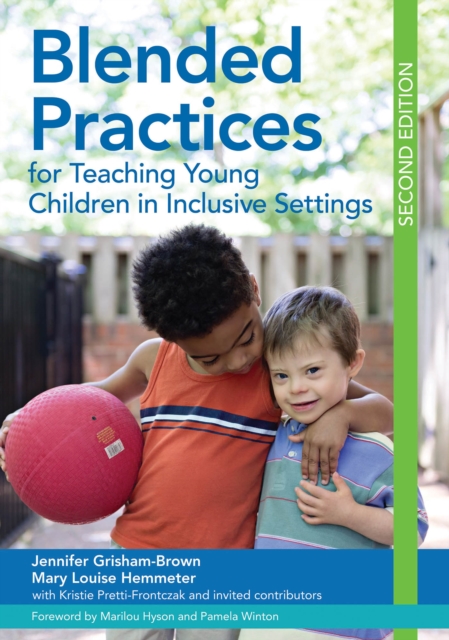
Blended Practices for Teaching Young Children in Inclusive Settings PDF
by Jennifer Grisham, Mary Louise Hemmeter, Kristie Pretti-Frontczak
Please note: eBooks can only be purchased with a UK issued credit card and all our eBooks (ePub and PDF) are DRM protected.
Description
As more and more early childhood settings implement inclusive practices, teachers need to blend special and general education techniques to help all children learn. They'll find out how with the new edition of this bestselling text, which combines today's best practices for teaching young children with and without disabilities into one comprehensive approach.
Ideal for current and future early childhood educators working with children from ages 2 to 5, this comprehensive text provides explicit guidance on developing a successful curriculum framework, working effectively with families and other team members, tailoring instruction to each child's individual needs, and embedding learning opportunities that address all children's goals. Teachers will learn from the field's most current research, and they'll get a full continuum of strategies for teaching young children with diverse abilities. Practical information on authentic assessment and data-driven decision-making is also woven throughout the book.
An essential reference to keep and use for years to come, this book is every early childhood educator's guide to blending the best of special and general education, developing effective curricula, and improving outcomes for all children.
WHAT'S NEW
USER-FRIENDLY FEATURES: Includes visual aids and sample forms, vignettes and practical examples that illustrate key concepts and guiding principles, helpful summaries for each chapter, case studies, and learning activities that challenge students to test and expand their knowledge.
See how this product helps strengthen Head Start program quality and school readiness.
Ideal for current and future early childhood educators working with children from ages 2 to 5, this comprehensive text provides explicit guidance on developing a successful curriculum framework, working effectively with families and other team members, tailoring instruction to each child's individual needs, and embedding learning opportunities that address all children's goals. Teachers will learn from the field's most current research, and they'll get a full continuum of strategies for teaching young children with diverse abilities. Practical information on authentic assessment and data-driven decision-making is also woven throughout the book.
An essential reference to keep and use for years to come, this book is every early childhood educator's guide to blending the best of special and general education, developing effective curricula, and improving outcomes for all children.
WHAT'S NEW
- Increased focus on how to implement multi-tiered systems of support (MTSS)
- New chapters on applying blended practices in specific content areas: language, literacy, social-emotional skills, and math
- The latest on state and federal funding initiatives for early childhoodand how to maintain quality practices that align with these initiatives
- More guidance on determining the scope and sequence of what to teach children
- Current recommendations from key professional organizations like NAEYC and DEC, and their implications for teachers
USER-FRIENDLY FEATURES: Includes visual aids and sample forms, vignettes and practical examples that illustrate key concepts and guiding principles, helpful summaries for each chapter, case studies, and learning activities that challenge students to test and expand their knowledge.
See how this product helps strengthen Head Start program quality and school readiness.
Information
-
Download - Immediately Available
- Format:PDF
- Pages:384 pages
- Publisher:Brookes Publishing
- Publication Date:12/01/2017
- Category:
- ISBN:9781598578966
Other Formats
- EPUB from £38.21
Information
-
Download - Immediately Available
- Format:PDF
- Pages:384 pages
- Publisher:Brookes Publishing
- Publication Date:12/01/2017
- Category:
- ISBN:9781598578966






